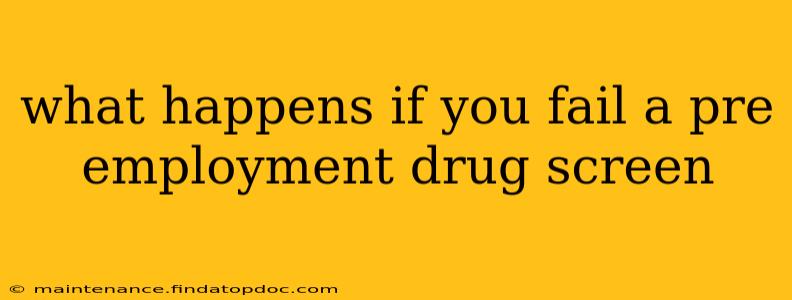What Happens if You Fail a Pre-Employment Drug Screen?
Failing a pre-employment drug screen can have significant consequences, effectively ending your chances of securing the job you applied for. The specific repercussions can vary depending on the company, the substance detected, and even the state or country. However, some common outcomes include:
What are the common consequences of failing a pre-employment drug test?
The most immediate consequence is disqualification from the hiring process. The employer will likely withdraw the job offer, and you won't be considered for the position. This can be incredibly disappointing and frustrating, especially if you've invested time and effort in the application and interview stages. In some cases, the company might contact you to inform you of the failed test and the reason for withdrawing the offer, but this isn't always the case. You might simply not hear back after the drug screening stage.
Can a failed drug test affect future job applications?
While not always the case, a failed drug test could potentially affect your future job applications. Most companies don't share this information with other companies, but there are exceptions. Furthermore, some companies conduct background checks that might reveal previous failed drug tests if the information is publicly available or accessible through certain databases.
What if the drug test result was a false positive?
It's crucial to understand that drug tests aren't always perfect and false positives can occur. If you believe you received a false positive result due to medication or other factors, you have options. You should immediately contact the testing company and the employer to explain your situation and provide any supporting documentation that could substantiate your claim.
What substances are typically screened for in pre-employment drug tests?
Standard pre-employment drug screens typically test for:
- Marijuana (THC): The presence of THC can vary widely depending on the individual and their frequency of use.
- Cocaine: A highly addictive stimulant that is easily detectable.
- Opiates (including heroin, morphine, and codeine): These substances are highly addictive and can lead to serious health consequences.
- Amphetamines (including methamphetamine): Stimulants frequently associated with addiction and health risks.
- PCP (phencyclidine): A powerful hallucinogen with potentially severe effects.
It's important to note: The specific substances tested for can vary depending on the company and the position you're applying for. Some employers may screen for more substances, particularly in safety-sensitive roles.
What should you do if you suspect a problem with your pre-employment drug test?
If you have legitimate concerns about the accuracy of your drug test result, address them promptly. Contact the testing facility immediately, and if possible, provide any evidence that supports your case (e.g., prescription information for medication that could trigger a false positive). Similarly, contact the employer and explain your situation. Be honest, respectful, and provide all relevant information.
How can I avoid failing a pre-employment drug screen?
The best way to avoid failing a pre-employment drug screen is to abstain from using illegal substances. This is the most straightforward and reliable way to ensure a positive outcome.
Failing a pre-employment drug screen can be a significant setback, but by understanding the potential consequences and preparing for the possibility, you can better navigate this situation. Remember, honesty and proactive communication are key in addressing any issues that may arise.
